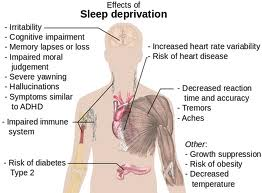Sleep deprivation
Sleep deprivation is the condition of not having enough sleep; it can be either chronic or acute. A chronic sleep-restricted state can cause fatigue, daytime sleepiness, clumsiness and weight loss or weight gain. It adversely affects the brain and cognitive function. Few studies have compared the effects of acute total sleep deprivation and chronic partial sleep restriction. Complete absence of sleep over long periods is impossible for humans to achieve (unless they suffer from fatal familial insomnia); brief
microsleeps cannot be avoided. Long-term total sleep deprivation has caused death in lab animals.
Physiological effects
microsleeps cannot be avoided. Long-term total sleep deprivation has caused death in lab animals.
Physiological effects
- Diabetes
- Effects on the brain
- Effects on growth
- Effects on the healing process
- Attention and working memory
- Impairment of ability
- Microsleeps
- Weight gain/loss


Comments
Post a Comment